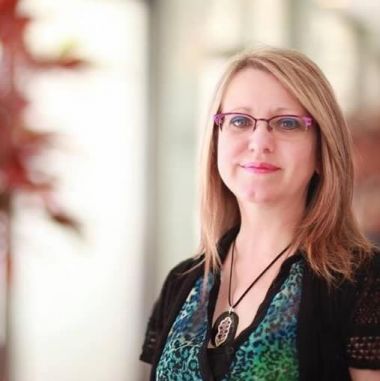'Atheist of the year' tells of exit from fundamentalist Quiverfull movement

A former leading light in the Christian "Quiverfull" movement made famous by the Duggar family, and recently named Atheist of the Year, has opened up about her experiences in the fundamental Christian community.
Vyckie Garrison, who founded No Longer Quivering to tell the story of her exit from the Quiverfull movement and to help women seeking to recover from what she describes as "spiritual abuse", said hers had been one of many fundamentalist families who take very seriously the idea that children are a blessing from the Lord, using a passage from the Psalms.
But they rarely referred to themselves by that name so often people who had never heard of the movement might be unaware that close relatives or friends were deeply involved. "It's very idealistic, very much this head trip of a godly happy family serving the word and doing things biblically," she told an atheist podcast at the American atheist convention in Memphis, Tennessee.
Garrison said she was "speechless" to receive the award of American Atheist of the Year.
Quiverfull has become well known because of the "19 Kids and Counting" reality TV show about the Duggar family, although the family do not describe themselves as belonging to the movement. Last month the show was suspended after the eldest son, Josh, apologised in the wake of reports that he had molested several underage girls as a teenager.
Ms Garrison said she had never planned to have a large family, and in fact had never even wanted children. In addition, she said she is an introvert and likes to be alone. But she became pregnant and after meeting and marrying her Christian husband, and went on to have six more children while in the Quiverfull movement. She said she gradually progressed towards fundamentalism, especially during the latter part of her life as a Christian.
She said when she looked into the scriptures to explore how God wanted her to model a marriage, she found a model based on patriarchy. "These families are just contorting themselves in their relationships to try and fit something," she said. It did not matter if the man was not a natural leader type, or had no desire to dominate his wife.
Even capable, professional women in the movement had to step back, be subservient and let their husband do the leading. The archetype family was the Duggar family, Garrison added.
She said Quiverfull was basically an expression of the pro-life movement. She had a baby and then felt she had to trust in God and be a good Christian mother so her daughter would have a better life than she had. At one point she even decided her fundamentalist Baptist church was too liberal and "wishy-washy" so left that church and founded a home church with like-minded families who all home-schooled their children. They called it a "biblical" church. "We were the true Christians," she said.
Garrison said she was committed to doing whatever was necessary to make sure her children had a good life, which was why things began to change.
"After a while I started to notice my kids were not thriving in that environment," she explained. They were not allowed to mix with public school children, and were told from birth that this was their life and that God had a plan for them. "When I saw how unhappy my children were, my brain was scrambling, it just did not compute."
At age 37, she decided to find her father, who she had never known, so she could "share the good news" - she found him in a Baptist church in Arkansas. "When I met him he was just so proud," Garrison recalls. She had been named Nebraska family of the year because of the pro-life pro-family newspaper she published.
Her father introduced her to an uncle with a warning that he was an atheist. She found she really liked him, and tried to justify her lifestyle without appealing to the Bible. "The more I tried to justify it I had to find reasons other than saying, 'Thus sayeth the Lord'," she said.
Eventually she concluded that if it wasn't for the Bible, nothing could justify the way she lived.
Garrison therefore decided that on its own, it was "crazy". She said that as she left, it was as if the whole world came crashing down. She had felt she had had a rock-solid foundation to her faith. "Everything in my life was centred around Jesus." Even their income came from the Christian family newspaper, but she got to the point where she realised she did not believe in enough of it to call herself a Christian.
"It was a big crashing mess," she said. She got divorced, "the Bible says God hatest divorce. Now that I didn't believe in the Bible it was like, 'goodbye'," and put her children into the public school system. Then she said she started to feel happy, and started to see her children come alive. "They had an opportunity to explore who they are, not what God wanted for their lives but who they wanted to be." Her youngest is now 12 and her oldest, 29.
She said she had herself been raised in a chaotic home and had wanted something solid, a formula by which to live and raise her family. It did not take years to change. Once her belief in God had disappeared, it was "like a house of cards", everything crumbled, Garrison said. Although she tried, she could not salvage anything of her original faith, even in feminist spirituality or liberal Christianity.
She confessed that one of the things she loves to do now is troll Christians, or "true believers" on Twitter.











